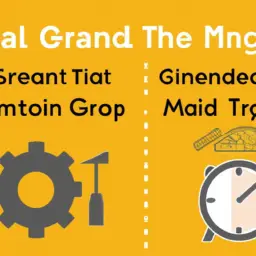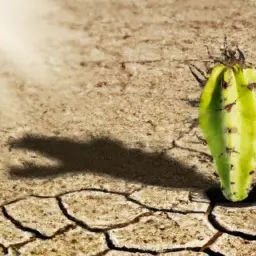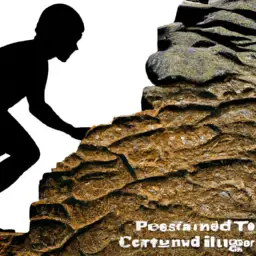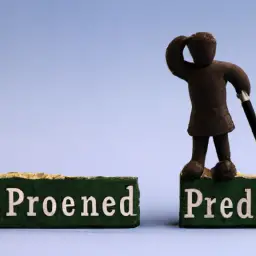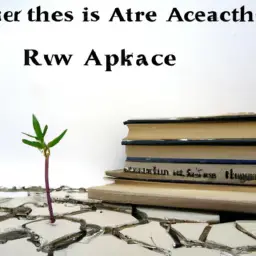You’ve probably heard the saying ‘practice makes perfect,’but is practice really enough to achieve success?
Some argue that it’s all about talent – that natural ability is the key to excelling in any field. However, others believe that grit is what separates the truly successful from the mediocre.
Grit can be defined as the combination of passion and perseverance. It’s the ability to keep going despite setbacks and obstacles, to remain focused on your goals and push through adversity.
Talent, on the other hand, refers to innate abilities and aptitudes – things that come naturally to you without much effort.
So, which is more important for success? Is it all about having the natural talent, or can grit take you just as far (if not further)?
In this article, we’ll explore the debate between grit and talent and discuss how you can develop both to achieve your goals.
Key Takeaways
- Grit and talent both play important roles in achieving success.
- Developing perseverance is crucial for cultivating grit.
- Talent can provide a foundation for success, but nurturing and developing skills is necessary.
- A growth mindset and willingness to put in effort are necessary for achieving personal growth and success.
Defining Grit and Talent
You might be wondering what grit and talent actually mean, but don’t worry, we’ll break it down for you so you can understand the complexities of these concepts and how they relate to success.
Grit is defined as the perseverance and passion for long-term goals. Talent, on the other hand, refers to a natural ability or skill in a certain area.
It’s important to note that grit can be influenced by one’s upbringing and environment, as well as their personal experiences.
Measuring talent objectively can be difficult, as it’s often subjective and can vary depending on the specific field or industry.
However, both grit and talent can play a significant role in achieving success. Understanding the nuances of these concepts can help individuals identify their strengths and weaknesses in pursuit of their goals.
The Importance of Grit
Achieving success isn’t just about natural abilities; it requires perseverance and determination. In fact, grit is often more important than skill for achieving long-term success.
Here are four reasons why perseverance and work ethic are key:
-
Perseverance keeps you going when things get tough. It’s the ability to push through challenges and setbacks, even when you feel like giving up.
-
Work ethic helps you stay focused and disciplined. It’s the willingness to put in the time and effort required to reach your goals, even when it’s not easy or fun.
-
Skill and aptitude are important, but they can only take you so far. Without perseverance and work ethic, even the most talented individuals will struggle to achieve lasting success.
-
Ultimately, your attitude and mindset will determine your success. If you have a strong work ethic and a never-give-up attitude, you can overcome almost any obstacle and achieve your goals.
In short, while talent and skill may give you a head start, it’s grit and determination that will help you reach the finish line. So if you want to achieve success in any area of your life, focus on developing your perseverance and work ethic, and don’t let setbacks or challenges derail you from your goals.
The Importance of Talent
When it comes to achieving success, the role of natural ability or talent is undeniable. Having innate talent can give you an edge over others and make achieving your goals easier.
Many successful people, such as athletes, musicians, and entrepreneurs, have attributed their success to their natural talents.
The Role of Natural Ability in Achieving Success
Although natural ability can provide a foundation for success, it’s often grit and determination that ultimately lead to achievement.
While some may argue that success is determined by genetics and innate abilities, it’s important to recognize that nurture plays a significant role in the development of these abilities.
It’s not enough to simply rely on natural talent – one must put in the hard work to hone and improve these skills.
To achieve success, it’s crucial to have a growth mindset and the willingness to put in the effort. This means embracing challenges and learning from failure, rather than giving up when faced with obstacles.
Additionally, having a strong support system and seeking out mentorship can provide the guidance and motivation needed to persevere.
Ultimately, it’s the combination of natural ability and determination that leads to success, rather than relying solely on one or the other.
The Benefits of Innate Talent
Having natural talent can be a significant advantage in certain fields, allowing individuals to excel with relative ease. This is the age-old debate of nature vs. nurture. While both factors play a role in determining success, there is no denying the inherent advantage that comes with being born with certain abilities. For example, a child born with an exceptional musical ear will have an easier time mastering an instrument than someone who lacks that innate talent.
This is not to say that hard work and determination are not important. In fact, even those with innate talent must put in the effort to hone their skills and reach their full potential. However, having natural abilities can give individuals a head start, allowing them to achieve success more quickly and with less effort. It is important to recognize and appreciate the benefits of innate talent, while also acknowledging the role of hard work and perseverance in achieving success.
| Pros of Innate Talent | Cons of Innate Talent | Examples of Fields Where Innate Talent is Beneficial | ||||
|---|---|---|---|---|---|---|
| Easier to excel | Can lead to complacency | Music | ||||
| Faster learning | Can lead to arrogance | Sports | ||||
| Higher potential | Can lead to neglect | Art | Deeper understanding | Can lead to isolation | Literature |
Examples of Successful People with Talent
Now that you’ve learned about the benefits of innate talent, let’s take a look at some examples of successful people who were born with natural abilities.
From Lionel Messi’s incredible soccer skills to Mozart’s prodigious musical talent, it’s clear that some individuals are simply blessed with an innate ability to excel in certain areas.
However, it’s important to acknowledge that even those with natural talent have limitations. Without nurturing and developing their skills, even the most gifted individuals may struggle to reach their full potential.
This is where hard work and dedication come into play, as well as the support of coaches, mentors, and other individuals who can provide guidance and opportunities for growth.
So, while innate talent can certainly provide a head start on the path to success, it’s ultimately the combination of talent and effort that leads to true greatness.
The Debate: Grit vs. Talent
The ongoing debate between grit and talent is like a tug-of-war between two equally strong opponents, each vying for the title of ultimate determinant of success.
On one hand, there are those who argue that talent is innate and that success is largely a result of one’s genetic makeup, or ‘nature.’ These individuals point to examples of child prodigies and athletes with natural abilities that set them apart from their peers.
On the other hand, there are those who believe that success is largely a result of hard work and perseverance, or ‘nurture.’ These individuals argue that grit can be learned and developed over time through practice and dedication.
To further illustrate this debate, consider the following unordered list of imagery:
- A marathon runner who trains for months on end, pushing through pain and exhaustion to cross the finish line
- A musician who spends countless hours practicing their instrument, honing their craft and perfecting their technique
- A business owner who perseveres through setbacks and failures, learning from their mistakes and constantly adapting their strategy
- A student who studies tirelessly, sacrificing social time and leisure activities to achieve academic success
- An athlete who overcomes physical limitations through sheer determination and commitment to their sport
While some may argue that natural talent played a role in these individuals’ success, it is clear that grit and hard work were also major factors. So, can grit be learned? The answer is yes. While some individuals may be naturally more inclined towards perseverance and dedication, anyone can develop grit through deliberate practice and a willingness to push through challenges and setbacks.
Ultimately, whether grit or talent matters more for success is a matter of perspective, but it is clear that both play important roles in achieving one’s goals.
Developing Grit and Talent
By putting in the effort and time, you can cultivate both your talents and grit in order to achieve personal growth and success. Building perseverance is key to developing grit, and this can be done by consistently working towards your goals, even when faced with obstacles.
When you encounter setbacks, it’s important to not give up and instead use them as opportunities to learn and grow. This can help you develop resilience and determination, which are essential components of grit.
Similarly, developing your talents also requires perseverance and overcoming obstacles. This can involve practicing your skills regularly, seeking feedback and advice, and being open to learning new techniques and approaches.
It’s also important to not be deterred by failures or setbacks, but instead use them as opportunities to refine your skills and improve. By combining perseverance with a growth mindset, you can cultivate both your talents and grit, paving the way for personal growth and achievement.
Frequently Asked Questions
How do grit and talent differ in terms of their impact on long-term success?
When it comes to long-term success, the importance of perseverance can’t be overstated. Your mindset and determination play a significant role in achieving your goals, regardless of talent.
Grit allows you to push through challenges and setbacks, and maintain focus on your objectives. While talent may give you a head start, it can only take you so far without the drive to continuously improve and overcome obstacles.
Ultimately, it’s the combination of both grit and talent that leads to sustained success.
Can someone with low levels of natural talent still achieve success with grit?
If you’re someone with low levels of natural talent, the importance of perseverance and strategies for improving grit can’t be emphasized enough.
Without talent, it may take longer to achieve success, but with determination, hard work, and a never-give-up attitude, it’s still possible.
Perseverance is key, and it means staying committed to your goals, even when the going gets tough.
Strategies for improving grit can include setting achievable goals, breaking up the journey into smaller milestones, and prioritizing your time and energy.
With time and effort, you’ll find that your grit improves, and success becomes more attainable.
Remember, grit is a skill that can be developed and improved upon, and it’s just as important as natural talent when it comes to achieving success.
Is it possible for someone to have high levels of both grit and talent?
You may wonder if it’s possible for someone to possess both grit and talent. The short answer is yes, it’s possible.
Grit and talent are not necessarily competing traits, but rather complementary ones. While some people may be born with a natural aptitude for a particular skill, it’s important to note that both grit and talent can be developed or inherited through nature vs. nurture.
In fact, individuals who possess both grit and talent are often able to achieve even greater levels of success than those who possess only one of these traits. Ultimately, it’s the combination of both grit and talent that can truly set you apart and help you reach your goals.
How can individuals identify and develop their own levels of grit and talent?
To identify and develop your own levels of grit and talent, start by identifying your strengths and cultivating your weaknesses.
Take time to reflect on your past achievements and the skills you used to reach them. This will help you understand what comes naturally to you and what you may need to work on.
Next, implement strategies for growth in areas where you may be lacking. This could include seeking out mentorship or taking skill-building classes.
It’s important to remember that grit and talent are not fixed traits, but rather qualities that can be developed through deliberate practice and hard work.
By focusing on identifying and cultivating your strengths while also implementing strategies for growth in areas of weakness, you can continue to develop both grit and talent throughout your life.
Are there any industries or fields where grit is more important than talent, or vice versa?
When it comes to the importance of grit in creative industries, it’s safe to say that it can make all the difference.
In fields such as writing, music, and art, having the determination to keep going despite rejection and setbacks is crucial.
On the other hand, in STEM fields, talent tends to play a larger role.
Technical skills and natural ability can give individuals an edge in fields like engineering and computer science.
However, this doesn’t necessarily mean that grit isn’t important in these fields as well.
The ability to persevere through difficult problems and setbacks can be a valuable asset in any industry.
Ultimately, the importance of grit and talent will vary based on the industry and individual circumstances.
Conclusion
So, which is more important for success: grit or talent? The answer is both.
While talent may give you a head start, it’s grit that will help you push through the inevitable challenges and setbacks that come with any pursuit. Without grit, even the most talented individual may falter and fail.
On the other hand, grit alone may not be enough to achieve success; talent is still a valuable asset that can help you reach new heights.
Ultimately, the key to success is developing both grit and talent. Luckily, both can be developed through hard work, perseverance, and a willingness to learn and grow.
By cultivating grit and honing your natural talents, you can maximize your potential and achieve your goals, no matter how lofty they may seem.
So don’t limit yourself by thinking you have to choose between grit and talent; instead, focus on developing both and watch as you soar to new heights of success.


































